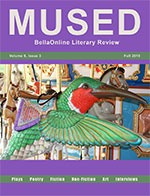A Visit To The Doctor
Susan P. Blevins
I strode purposefully out of the big glass doors of the Hotel Sonargaon, in Dhaka, Bangladesh, and stepped into the waiting tuk-tuk which the front desk had called for me. I had my destination written down on a piece of paper and handed it to the driver.
I had been traveling alone around Asia exploring, and thought it would be interesting to visit Bangladesh, since the country was poised to have its first democratic elections since the country gained independence in 1972. I was currently writing for one of Europe’s English-language, international newspapers, published in Rome, where I was living at the time. I thought there might be a chance of yet another military coup, and I would be on the spot to give full coverage. As it turned out, the election was peaceful and ushered in an age of relative calm in the country’s turbulent history.
I had flown in the previous day from Kathmandu, where I had picked up a persistent urinary infection from swimming in the icy water of the Yak and Yeti hotel swimming-pool, a nagging case of cystitis which would not go away. I had obtained the name and address of a female OB/GYN from the hotel, and that was my current destination.
I set off through the unmistakable morning smells of the Indian subcontinent. Residue of the acrid smoke from ubiquitous dung fires that burn every night hung ponderously in the air, and aromas from the cooking stoves added their spiciness. Most pungent of all, however, were the pervasive smells of the Buriganga River which assailed my nostrils. Repository for much of the city’s garbage, and sewage, with even an occasional carcass of some unfortunate animal floating by, it is a heavily clogged artery in the struggling body of the city.
The tricycle taxi lurched its way through the densely crowded streets, pushing people to one side like a boat ploughing through stormy waters.
We eventually reached a quieter part of town, with villas surrounded by gardens set behind high walls. I was able to read an occasional engraved brass plate identifying the building as an embassy or consulate. I felt reassured to be in the diplomatic part of the city.
As we hurtled along the wide, empty streets, bounding towards us came the biggest dog I had ever seen. He was almost as large as a small pony, and we were on a collision course. To my horror, the driver did not slow down, so we collided, bouncing the tuk-tuk over until it rested on its side on the grass verge. The large dog was unhurt by the encounter and loped off into the distance. For a moment we lay there, unspeaking, each assessing our predicament and physical condition.
I ascertained that I could move everything and set about crawling out of the door, which was now directly overhead. The driver was moaning ominously. Within thirty seconds of the accident, a noisy crowd of angry Bangladeshi men had gathered, dispelling my illusions of peace and quiet, gesticulating and pointing at me accusingly. They pulled the driver out of the vehicle, who was groaning and rolling his eyes, and laid him on the grass. I was growing increasingly apprehensive by this point, and felt very vulnerable.
I was relieved when an English-speaking embassy driver in an official car stopped and intervened. He sent the men packing, spoke to the driver, helped him to right the tuk-tuk, and told me he would take me to my destination. I handed the shaken tuk-tuk driver as much cash as I could to help his family in case he could not work for a few days, and proceeded to the doctor’s office in the comfort of a diplomatic limousine.
I entered the waiting-room to find about twenty heavily pregnant women sitting on benches, dressed in brightly colored saris, looking like tropical birds readying for flight. They all turned and stared at me, obviously discussing me, until eventually I was called in to see the doctor, a handsome woman wearing a sari under a white coat.
No sooner had I entered the office than the electricity failed, leaving only a dim light struggling through a dirty window. The doctor was unperturbed by this apparently customary inconvenience and pulled out a large flashlight, telling me to get on the examination table, a low structure covered in floral oilcloth looking more suited to teacups and cakes than a medical examination. The doctor was very thorough and professional. The entire examination was conducted by flashlight, ending with a prescription written in Bengali which I was to fill at a pharmacy.
I dressed, paid, and the receptionist called a tuk-tuk to take me back to my hotel. By this time I was feeling shaky and had one of the worst headaches of my life. I made the return trip uneventfully and handed the prescription to the hotel concierge, asking them to send someone to a pharmacy to have it filled.
Two hours later I was handed the medicine and to my consternation saw that every word on the label was written in Chinese, so I had no idea how many pills to take. I made a wild guess by dividing the total number of pills by seven, assuming it was a week’s supply, and was shocked when my urine turned bright blue soon after I started taking the pills. I learned subsequently that this was the expected effect of a urinary disinfectant, but at the time I could only hope for the best.
The cystitis cleared up quickly, leaving me free to continue my misadventures in Asia.

